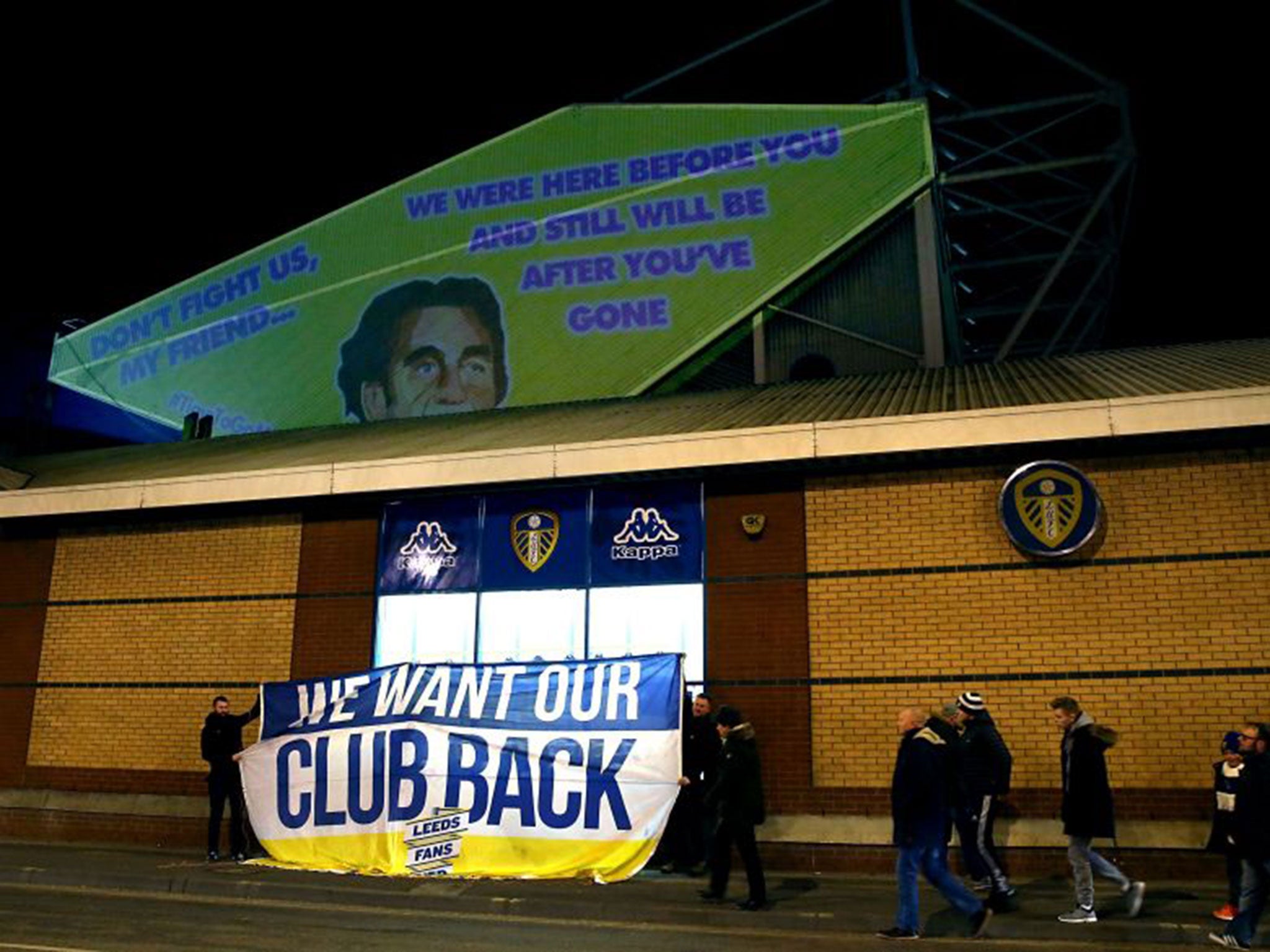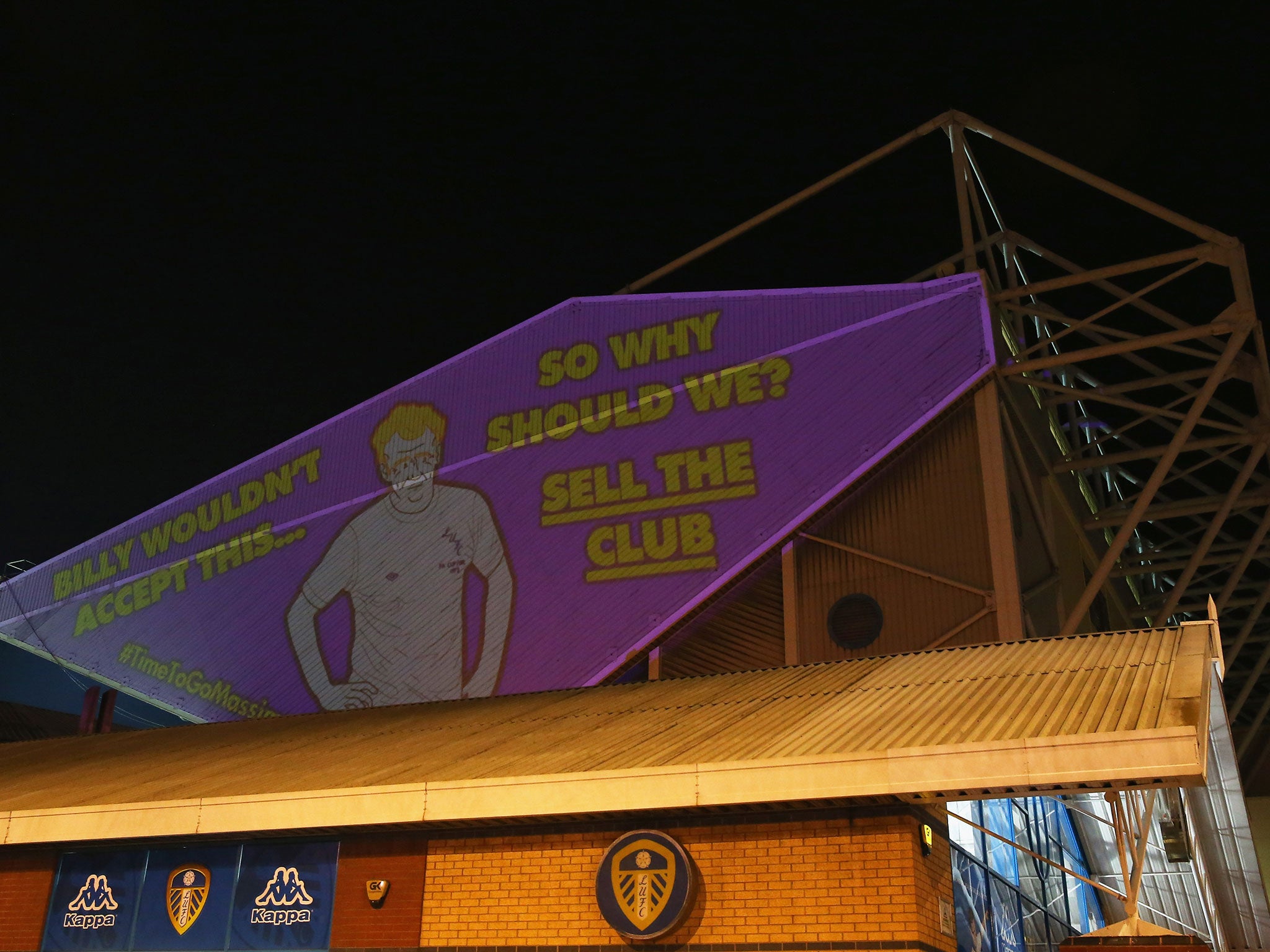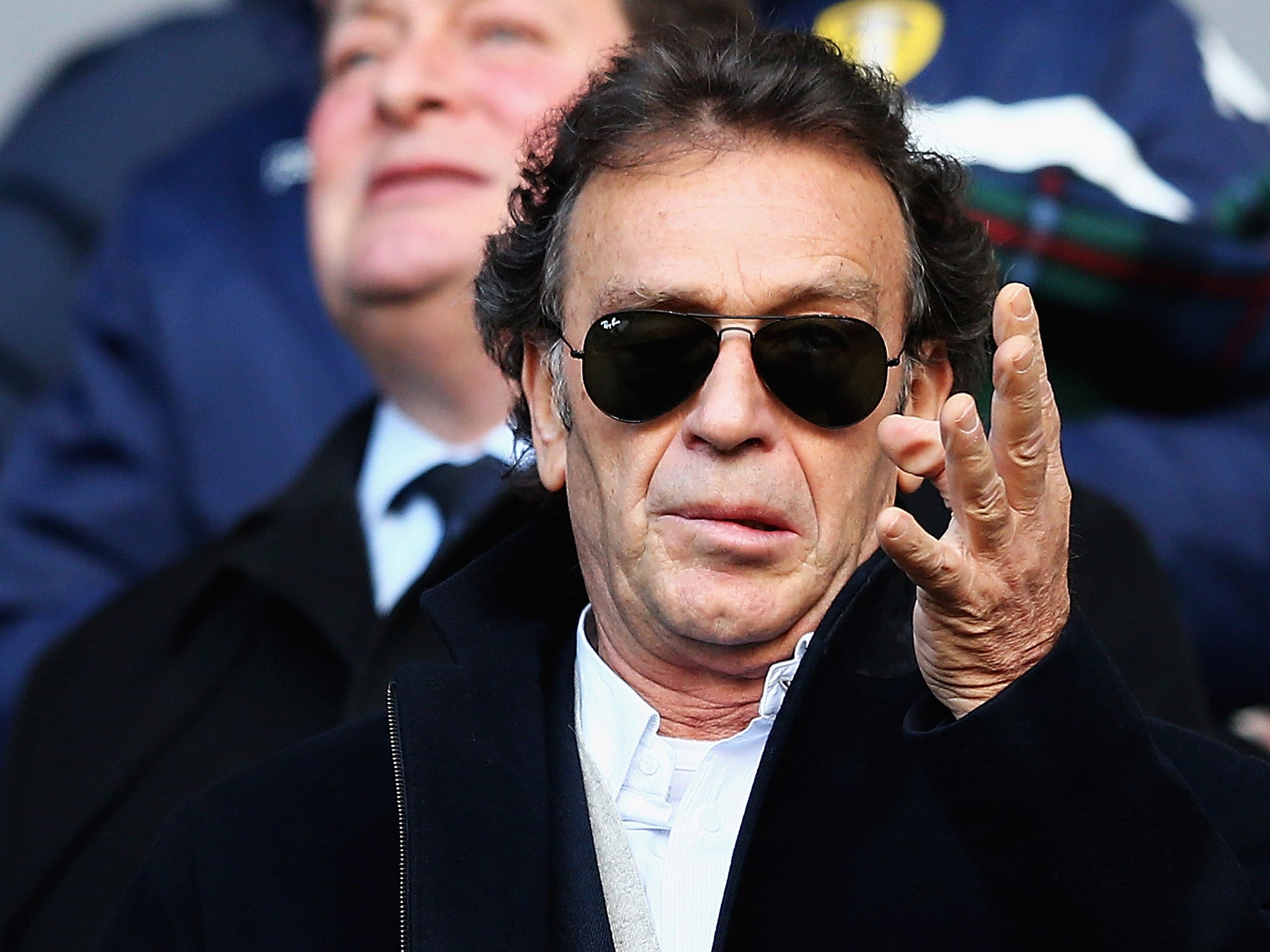Court cases, protests, bans and sacked managers, but Massimo Cellino leaves Leeds United in healthier circumstances
He inherited a wretched mess from previous owners GFH but made plenty of his own problems

Your support helps us to tell the story
From reproductive rights to climate change to Big Tech, The Independent is on the ground when the story is developing. Whether it's investigating the financials of Elon Musk's pro-Trump PAC or producing our latest documentary, 'The A Word', which shines a light on the American women fighting for reproductive rights, we know how important it is to parse out the facts from the messaging.
At such a critical moment in US history, we need reporters on the ground. Your donation allows us to keep sending journalists to speak to both sides of the story.
The Independent is trusted by Americans across the entire political spectrum. And unlike many other quality news outlets, we choose not to lock Americans out of our reporting and analysis with paywalls. We believe quality journalism should be available to everyone, paid for by those who can afford it.
Your support makes all the difference.The one thing you cannot take away from Massimo Cellino is that he leaves Leeds United in far healthier and calmer circumstances than those he arrived in, chased out of an Elland Road car park in a taxi by vexed supporters who sensed from the off that their latest owner spelled trouble.
His arrival on a warped evening back in January 2014 became known afterwards as ‘Mad Friday’, but the madness never really stopped during three years of high jinks and questionable decisions. Yet the Italian departs on the back of Leeds’ most successful season in years under Garry Monk, with media rights mogul Andrea Radrizzani having bought the club outright on Tuesday and the Championship basket-case baton being swiped away last season to Nottingham, Birmingham and Blackburn.
Cellino’s time in Yorkshire will never be forgotten. Divisive, emotional, entertaining and infuriating, the continual conundrum was how such an intelligent and shrewd man could so often make inexplicable decisions. It was as if he revelled in the play, a thespian whose own stage was regularly more compelling than the football he seemed to love and hate.
In Italy there are other owners and chairmen cut from similar cloth, but English football had never seen anything like Cellino. For the most part he was a one-man band, certainly in the early months of his reign when he made bold promises despite inheriting a wretched mess from the former owners, the Bahrain-based investment bank Gulf Finance House (GFH).
Back then he was easily accessible, happy to speak at length on the phone when he needed some time to vent. On one particular afternoon he told me he had climbed into his office at the stadium through a window after being locked out.
His most significant error was perhaps not undertaking sufficient due diligence when buying Leeds in 2014. GFH had left the club in a dreadful state and it is little wonder Cellino’s target of promotion within two years and the re-purchase of Elland Road from private hands never materialised.
But while many problems were inherited, a vast number were created. There were seven managers in three years, numerous feuds of extreme severity and the abominable treatment of the club’s former welfare officer Lucy Ward, who won an unlawful dismissal and sexual discrimination case against the club at a tribunal.
Cellino hired a priest to bless the pitch, cooked the team a pre-match meal of pasta, stood with the fans at Brentford after being photographed eating a hot dog, and played guitar on stage at an end-of-year-awards party. There was also the small matter of two Football League bans, one which he served, and a more recent Football Association sanction regarding agent regulations and Ross McCormack's transfer to Fulham in 2014. Whenever he found himself accused of wrongdoing, Cellino denied all culpability.
He caused headaches for the League from the moment he arrived – particularly in 2015 when threatening to ban the Sky Sports cameras from Leeds' home match against Derby County – and carved ructions within a fanbase so disheartened by recent owners that elaborate protests became a necessary emotional therapy.
Cellino began by sacking Brian McDermott on 'Mad Friday', his first night in Leeds, only for the manager to be reinstated 48 hours later. McDermott was followed in the dugout by the unknown non-league coach David Hockaday, the Slovenian Darko Milanic, Uwe Rosler, Neil Redfearn and Steve Evans. Save for a short period under Redfearn (while Cellino was absent during a League suspension) there was never much unity until Monk's appointment, by far and away his best decision.

The most perplexing move, however, was to call on Hockaday, setting the tumultuous tone immediately by naming an unknown as his first manager whose previous job had been with Forest Green Rovers. Of his appointment, Hockaday, who has since had short spells at Swindon Supermarine, Coventry and Kidderminster Harriers, recalls: “I got a phone call from an Italian voice saying they had a sponsor who owns a football club, he’s looking for the best English coaches available and your name keeps cropping up. Would you like to meet? It seemed genuine, although it was cloak and dagger stuff.
“I went but didn’t know who it was I was meeting, although I had a pretty good idea. I met with the voice and was then introduced to Mr Cellino. We sat in a London hotel for about five hours moving salt and pepper pots, cups and things, to discuss football. I thought it was going quite well, that he seemed to like me and was very engaging, and that he might want me as his Under-21 coach or a first-team coach to help the foreign players coming in. Towards the end of the meeting he said ‘I’m really enjoying this, I’d like you to be my head coach’. The voice next to me, his chin hit the floor.
“We shook hands and I was asked not to tell anyone. I had another two meetings, each one more clandestine than the last; get a train to this city, go to this hotel, phone call, turn down here, go to another hotel. It was as if someone had scouted the area and done reconnaissance. It was interesting. I met up with Mr Cellino, the president, on a number of occasions and we got on really well. I drove up to Manchester and he said it would all be announced tomorrow, then I was taken out in front of the media.”
Hockaday lasted six matches before Milanic, a former international defender, joined from Sturm Graz. He was gone after 32 days, the shortest serving permanent manager in the club's history, eclipsing the joint record of Brian Clough and Jock Stein who were each manager for 44 days. Milanic didn't even have time to move out of the Marriott Hotel.
Few were surprised when Cellino's head coaches fell with such haste, the agricultural magnate previously known in Sardinia as the King of Corn having been through 36 in 22 years as president of Cagliari. However, the dramatic nature of each manager's demise never failed to provoke ire.
McDermott, the first of Cellino's sackings, was eating a takeaway at home when his departure played out publicly on Sky. He says: “I told my mate Mick that my contract had been terminated. He came over to my flat, we had a Chinese takeaway and watched it unfold on TV. I got the lawyer’s call in the late afternoon, I was like ‘who’s this’ and he said Chris such and such. He said a letter was going to be on its way to me, then I got a call from the club secretary saying ‘I’m really sorry to do this, but what’s your address?’ The letter never arrived. Ross [McCormack] came on the TV, it was all a bit surreal really. Then we went out in Harrogate and people kept coming up to me saying ‘what’s going on?’
“Obviously he had set ideas and was putting in his own money, the club was in a bit of a state [under GFH] by all accounts. It was all a bit crazy when you think about it.”
There were bizarre explanations that coaches were like ”watermelons” and chosen because of their “good looks”. During Redfearn's spell in charge his assistant Steve Thompson was suspended without a reason given. The softly-spoken sporting director, Nicola Salerno, was tasked with breaking the news to Thompson before fleeing for Italy and never returning. Then came Rosler whose promise of “heavy metal” football lasted almost as long as a Guns N' Roses guitar riff before Evans stepped into the breach for seven months.

There were many other curious cameos throughout Cellino's three years at Leeds; Benito Carbone spent two months as technical director, Gianluca Festa was present at Thorp Arch training ground for a few days before McDermott was sacked and then vanished, and save a thought for Andrea Tabanelli, the midfielder who travelled from Cesena to Leeds shortly after 'Mad Friday' only to swiftly return hours later because the transfer had not been sanctioned by the Football League. Verne Troyer (Mini-Me from Austin Powers) was also a guest at Elland Road on more than one occasion.
Yet while Cellino's eccentric behaviour was initially endearing, the laughter gradually stopped. Supporters quarrelled vehemently about their owner and by the closing months the overwhelming majority were in favour of a fresh start.
There had been too much division under Cellino, too many days where fans scoured the internet trying to read up on the many facets of Italian law, whether legal judgements made in Sardinia were binding in Britain and if their labyrinthine appeals system could affect his ownership.
It is no co-incidence that the comparably serene campaign of 2016/17 passed with little controversy when Cellino was often away. With a takeover having been agreed for some time, Monk was left to build a team that punched above its weight in the Championship without too much bother from upstairs, finishing seventh following a late dip in form. Yet there was still time for some fun, when the outgoing chief executive Ben Mansford sat alongside the owner at a press conference insisting Monk was completely happy with his squad only for Cellino to mimic a Pinocchio nose without him noticing.
Radrizzani, his compatriot, will almost certainly take a more measured approach. It has probably helped oil the wheels during this protracted takeover that he is also Italian, but whether he has the financial clout to return Leeds to the Premier League after their relegation in 2004 remains to be seen.
As for Cellino, his parting shot to the new owner said it all: “If you can survive working with me, you can survive anything!”
Join our commenting forum
Join thought-provoking conversations, follow other Independent readers and see their replies
Comments